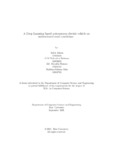A deep learning based autonomous electric vehicle on unstructured road conditions
Abstract
Autonomous driving vehicles are too known as driver-less cars which is one of the
foremost astounding advances of the twenty-first century, anticipated to be driverless,
effective, and crash dodging ideal urban cars of the future. Autonomous cars
actually sense the environment, navigate and fulfill human transportation capabilities
without any human inclusion. Cameras, radar, lidar, GPS, and navigational
pathways help this type of vehicle detect its surroundings[6]. Even when the conditions
alter, advanced control systems interpret sensory data to maintain their locations.
Autonomous vehicles are on their way to completely replacing the world’s
transportation system. To reach this goal automobile industries have begun working
in this zone to realize the potential and unravel the challenges as of now. A few
companies have also started their trail. It will aid in reducing traffic, reducing pollution,
avoiding maximum accidents, saving time, conserving energy, and improving
human safety. As a result, with the aim and vision of eradicating these challenges
from our country, we are focusing on an independent car that will assist us in saving
ourselves from the daily revelations we generally confront on the road. Besides, it
is high time we began working in Bangladesh on a driver-less vehicle.

